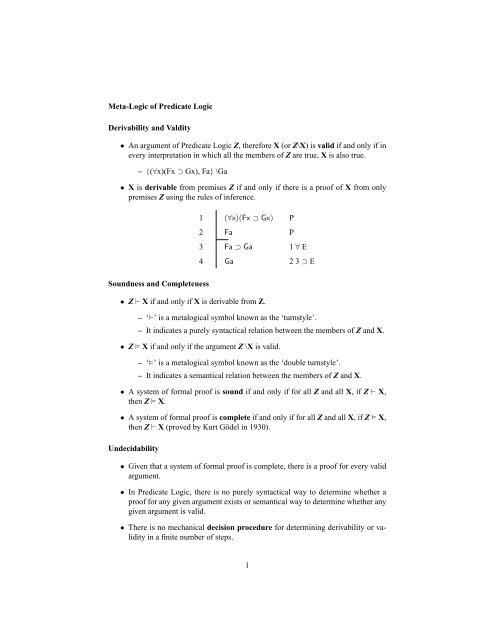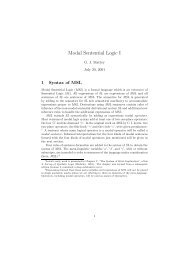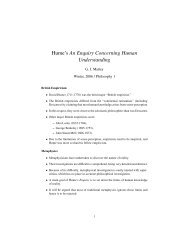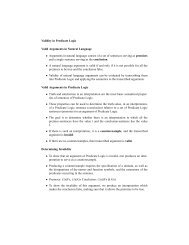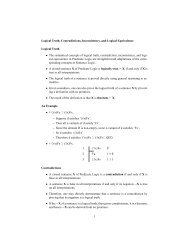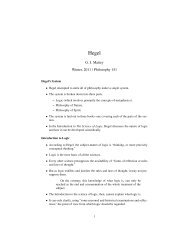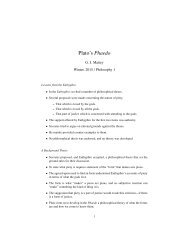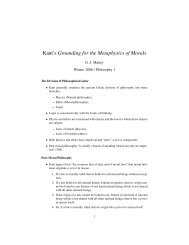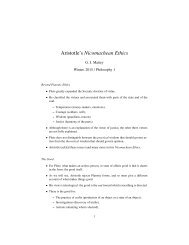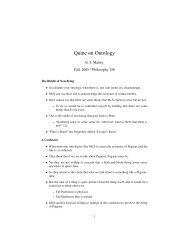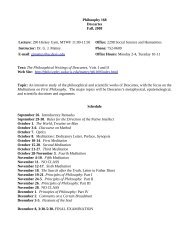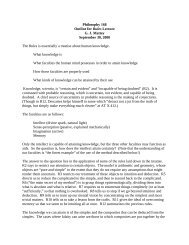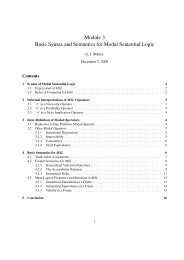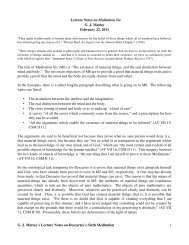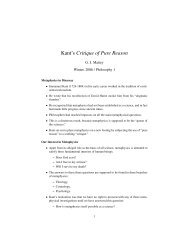Meta-Logic of Predicate Logic - the UC Davis Philosophy Department
Meta-Logic of Predicate Logic - the UC Davis Philosophy Department
Meta-Logic of Predicate Logic - the UC Davis Philosophy Department
Create successful ePaper yourself
Turn your PDF publications into a flip-book with our unique Google optimized e-Paper software.
<strong>Meta</strong>-<strong>Logic</strong> <strong>of</strong> <strong>Predicate</strong> <strong>Logic</strong><br />
Derivability and Valdity<br />
• An argument <strong>of</strong> <strong>Predicate</strong> <strong>Logic</strong> Z, <strong>the</strong>refore X (or Z\X) is valid if and only if in<br />
every interpretation in which all <strong>the</strong> members <strong>of</strong> Z are true, X is also true.<br />
– {(∀x)(Fx ⊃ Gx), Fa} \Ga<br />
• X is derivable from premises Z if and only if <strong>the</strong>re is a pro<strong>of</strong> <strong>of</strong> X from only<br />
premises Z using <strong>the</strong> rules <strong>of</strong> inference.<br />
Soundness and Completeness<br />
1 (∀x)(Fx ⊃ Gx) P<br />
2 Fa P<br />
3 Fa ⊃ Ga 1 ∀ E<br />
4 Ga 2 3 ⊃ E<br />
• Z ⊢ X if and only if X is derivable from Z.<br />
– ‘⊢’ is a metalogical symbol known as <strong>the</strong> ‘turnstyle’.<br />
– It indicates a purely syntactical relation between <strong>the</strong> members <strong>of</strong> Z and X.<br />
• Z X if and only if <strong>the</strong> argument Z \X is valid.<br />
– ‘’ is a metalogical symbol known as <strong>the</strong> ‘double turnstyle’.<br />
– It indicates a semantical relation between <strong>the</strong> members <strong>of</strong> Z and X.<br />
• A system <strong>of</strong> formal pro<strong>of</strong> is sound if and only if for all Z and all X, if Z ⊢ X,<br />
<strong>the</strong>n Z X.<br />
• A system <strong>of</strong> formal pro<strong>of</strong> is complete if and only if for all Z and all X, if Z X,<br />
<strong>the</strong>n Z ⊢ X (proved by Kurt Gödel in 1930).<br />
Undecidability<br />
• Given that a system <strong>of</strong> formal pro<strong>of</strong> is complete, <strong>the</strong>re is a pro<strong>of</strong> for every valid<br />
argument.<br />
• In <strong>Predicate</strong> <strong>Logic</strong>, <strong>the</strong>re is no purely syntactical way to determine whe<strong>the</strong>r a<br />
pro<strong>of</strong> for any given argument exists or semantical way to determine whe<strong>the</strong>r any<br />
given argument is valid.<br />
• There is no mechanical decision procedure for determining derivability or validity<br />
in a finite number <strong>of</strong> steps.<br />
1
• Thus <strong>Predicate</strong> <strong>Logic</strong> is undecidable (proved by Alonzo Church in 1936).<br />
• However, various fragments <strong>of</strong> <strong>Predicate</strong> <strong>Logic</strong> are decidable.<br />
– For example, <strong>the</strong> set <strong>of</strong> sentences <strong>of</strong> <strong>Predicate</strong> <strong>Logic</strong> in which no predicate<br />
has more than one argument.<br />
Second-Order <strong>Predicate</strong> <strong>Logic</strong><br />
• <strong>Predicate</strong> <strong>Logic</strong>, originallly proposed by Frege, can be extended by allowing<br />
quantification over predicates.<br />
– For example, we might formulate an axiom <strong>of</strong> identity.<br />
– (∀x)(∀y)(x = y ≡ (∀P)(Px ≡ Py)).<br />
• Semantically, <strong>the</strong> quantifiers would range over properties or sets, ra<strong>the</strong>r than <strong>the</strong><br />
objects in <strong>the</strong> domain over which first-order quantifiers range.<br />
• Second-order logic cannot be given a pro<strong>of</strong> system which is sound and complete<br />
relative to its interpretation, though fragments <strong>of</strong> it can be given a sound and<br />
complete pro<strong>of</strong> system.<br />
• As with first-order logic, <strong>the</strong> fragment <strong>of</strong> second-order logic consisting <strong>of</strong> none<br />
but one-place predicates is decidable.<br />
• It is possible to construct logics <strong>of</strong> higher, even infinite, order.<br />
2


